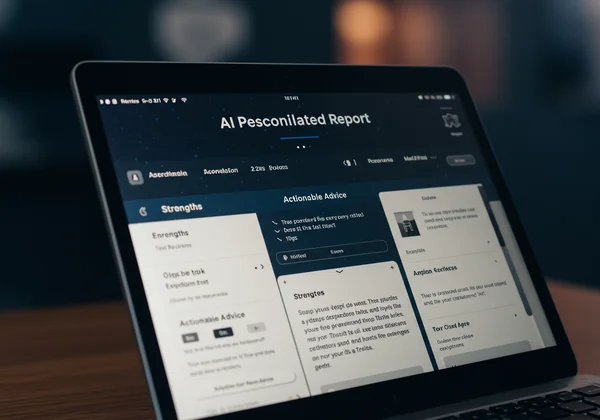Psychopathy Test & AI Insights: Understanding Your High Score
Receiving a high score on a psychopathy test can be a jarring experience. It’s natural to feel a mix of confusion, concern, or even morbid curiosity. You might be asking yourself, How do I know if I'm a psychopath? Before you jump to any conclusions, take a deep breath. This guide is designed to provide clarity, reassure you that an online screening is not a clinical diagnosis, and outline the responsible steps you can take to understand your unique personality traits better. Your result isn't a label; it's a starting point for deeper self-awareness. To begin that journey of understanding, you can always revisit your results or explore our test.

Interpreting Your High Psychopathy Score
The first step after receiving your results is to place them in the proper context. A number on a screen lacks nuance, but your personality is complex and multi-faceted. Understanding what that number truly represents is key to moving forward constructively. This isn't about confirming a fear, but about gaining valuable insight into your psychological makeup.
Understanding Psychopathy as a Spectrum of Traits, Not a Diagnosis
It is critically important to understand that psychopathy is not a simple "yes or no" condition. Modern psychology views these characteristics as existing on a spectrum. Think of it like a color gradient rather than a light switch that's either on or off. A high score on a screening tool simply suggests that you may possess more of certain traits—such as emotional detachment, impulsivity, or a lack of empathy—than the average person. It does not mean you fit a rigid, predetermined mold. Many successful leaders, surgeons, and athletes exhibit some of these traits without it causing harm to themselves or others. The key is how these traits manifest and are managed in your daily life.

The Role of Online Tests: Screening Tools, Not Definitive Assessments
Our online Psychopathy Test is a scientifically-inspired screening tool designed to provide preliminary insights. It is an educational and informational resource, not a substitute for a comprehensive clinical evaluation conducted by a qualified mental health professional. Consider it a first step—a way to identify potential patterns in your personality that may warrant further exploration. These online psychopathy tests are excellent for raising self-awareness, but they cannot capture the full context of your life experiences, intentions, or overall mental health. They are designed to start a conversation with yourself, not to end it with a label.
What Specific Traits Might a High Score Indicate?
So, what does a high score actually point to? It generally indicates a pattern of certain interpersonal, affective, and behavioral characteristics. These can include:
- Interpersonal Style: You might be seen as charming, witty, and engaging on the surface, but may struggle with deeper, meaningful connections. Some may describe you as having a manipulative or grandiose style.
- Affective Experience: This refers to your emotional life. A high score could suggest a shallower emotional experience, difficulty recognizing or relating to the emotions of others (low empathy), and a limited capacity for guilt or remorse.
- Lifestyle & Behavior: Traits in this category often include a tendency towards impulsivity, a need for stimulation, and sometimes a history of irresponsible behavior. This doesn't apply to everyone, as many high-functioning individuals channel these traits productively.
Recognizing these potential patterns is the first step toward understanding how they influence your relationships, career, and personal satisfaction.
Actionable Next Steps After Your Psychopathy Test
Your psychopathy test result is not an endpoint; it's a doorway to greater self-knowledge. Rather than dwelling on the score itself, you can use it as a catalyst for positive action and deeper understanding. Here are practical, constructive steps you can take right now.
Unlocking Deeper Self-Understanding with Your AI Personalized Report
While the initial score provides a general overview, it's only scratching the surface. The most valuable next step you can take is to unlock your AI Personalized Report. This is the core advantage of our platform. Our AI system analyzes your unique response pattern to generate a comprehensive profile that goes far beyond a simple number. It will help you:
- Identify Your Strengths: Discover how certain traits, like calmness under pressure or logical decision-making, can be powerful assets in your personal and professional life.
- Understand Your Challenges: Gain clear insight into how traits like low empathy or impulsivity might be creating friction in your relationships or holding you back.
- Receive Actionable Advice: The report provides personalized suggestions and strategies for managing your challenges and leveraging your strengths for personal growth.
This in-depth analysis transforms your score from a static label into a dynamic tool for self-improvement. To truly understand your profile, we encourage you to get your results.

Reflective Journaling: Connecting Your Traits to Real-Life Experiences
Another powerful, immediate step is reflective journaling. This practice helps you connect the abstract traits identified in the test to your concrete, lived experiences. Set aside 10-15 minutes each day to consider the following prompts:
- When was the last time I felt a strong emotion? What was it, and what triggered it?
- Think of a recent conflict. Did I consider the other person's feelings? How did their emotional state affect my actions?
- Describe a time I took a big risk. What was my thought process? Was it impulsive or calculated?
- How do I typically react when someone asks me for help or shares a personal problem?
This process of self-reflection builds awareness and helps you see how these personality patterns play out in the real world, giving you more control over your responses.
When and How to Seek Professional Guidance
While self-exploration is invaluable, there are times when professional guidance is the most responsible and effective path forward. An online test can be a helpful guide, but a mental health expert is a trained navigator who can help you traverse complex psychological terrain.
Identifying Signs That Warrant a Clinical Consultation
It's time to consider speaking with a professional if the traits indicated by your score are causing significant and persistent problems in your life. Key signs include:
- Impaired Relationships: You consistently struggle to maintain stable, healthy relationships with family, partners, or friends.
- Occupational or Legal Trouble: Your behavior has led to issues at work, financial instability, or conflicts with the law.
- Significant Personal Distress: Although often associated with a lack of distress, many individuals with these traits feel a sense of emptiness, frustration, or confusion that they cannot resolve on their own.
- Harm to Others: You recognize that your actions, whether intentional or not, are causing emotional or physical harm to those around you.
Navigating the Search for a Qualified Mental Health Professional
Finding the right professional is crucial. Look for a licensed clinical psychologist, psychiatrist, or therapist who has specific experience with personality disorders or personality assessment. When you reach out, you can be direct: "I took an online psychopathy screening tool and received a high score. I'd like to understand these traits better in a clinical context." This provides a clear starting point for your consultation. A professional can conduct a formal assessment, which involves structured interviews and validated diagnostic tools far more comprehensive than any online psychopathy test.
Understanding What Therapy or Management Might Involve
For individuals with prominent psychopathic traits, therapy is less about a "cure" and more about management and skill-building. The goal is to reduce harmful behaviors and improve overall quality of life. Therapeutic approaches might focus on:
- Behavioral Management: Developing strategies to control impulsivity and think through the consequences of actions.
- Cognitive Restructuring: Identifying and challenging thought patterns that lead to manipulative or antisocial behavior.
- Skill Development: Learning and practicing pro-social behaviors, even if the underlying emotional motivation (like empathy) is weak.
This journey is about learning to work with your unique psychological profile to achieve your goals in a more constructive and sustainable way.

Beyond the Score: Empowering Your Path to Self-Understanding
A high score on a psychopathy test marks the beginning of a crucial journey toward self-awareness, not a fixed destination. By leveraging our AI Personalized Report, you gain clear insights into your unique traits and actionable strategies for growth. Remember, understanding your psychological profile empowers you to shape your future responsibly. Begin this transformative process with us today.
Ready to take that first step? Start your test today to gain a new perspective on who you are.
Frequently Asked Questions After a Psychopathy Test
Can you really test for psychopathy online?
Online psychopathy tests like ours are effective screening tools that can indicate the presence of certain psychopathic traits. However, they are not diagnostic instruments. A formal diagnosis can only be made by a qualified mental health professional through in-depth clinical assessment. Think of our test as a reliable first look, not the final word.
How do I know if my high score means I'm a psychopath?
A high score does not automatically mean you are a psychopath. It suggests you exhibit a higher-than-average level of traits associated with the psychopathy spectrum. The label itself is less important than understanding how these specific traits—like impulsivity or low empathy—affect your life. The best way to get a nuanced view is to review an in-depth analysis, like our AI Personalized Report, or to learn more here.
Can a person with psychopathic traits be a "good" person?
Absolutely. Morality and behavior are choices. Many people with psychopathic traits lead productive, law-abiding lives. They can use their unique characteristics, such as fearlessness and a logical mindset, for positive ends. Being a "good" person is defined by one's actions and contributions, not by an inherent personality structure.
What's the difference between psychopathy and sociopathy in this context?
While often used interchangeably, many experts see a distinction. Psychopathy is thought to have stronger genetic and biological roots, characterized by a profound lack of empathy. Sociopathy is often seen as more of a product of one's environment (like trauma or upbringing) and may be characterized by more erratic and impulsive behavior. Our our screening tool assesses traits common to both concepts.
Is there any "treatment" if I exhibit psychopathic traits?
"Management" is a more accurate term than "treatment." While core personality traits are stable, the behaviors associated with them can be managed. Therapeutic approaches focus on developing impulse control, understanding social consequences, and learning pro-social behaviors to improve relationships and overall life functioning.